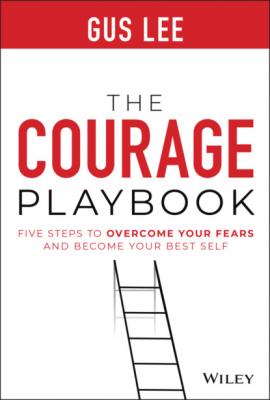The Courage Playbook. Gus Lee
Чтение книги онлайн.
Читать онлайн книгу The Courage Playbook - Gus Lee страница 16
 id="ulink_089880ec-91bf-5a4e-8339-811c9fbb33ec">
id="ulink_089880ec-91bf-5a4e-8339-811c9fbb33ec">
The Tier 4 GPS Tool
“Endless confusion about actions and results can be avoided by simply asking if each choice is correct in the moral frame.”
—Robert Galbreath 5
We saw in the Introduction that we need courage to live without constant anxiety and worry. We also need courage to truly love, to be deeply loved, to actually know others, and to be authentically known. We need courage to know the right thing and to then do it. We need courage to first lead ourselves, and then lead others.
The process of knowing the right from the wrong should be simple, but we clutter up a straightforward sequence with old fears, new stresses, and anxious habits. Finding a tool to help us came about in a surprisingly easy way. My wife, Diane, and I were in remote western Kenya, visiting our daughter and her husband. Each was the CEO of a nonprofit that together brought clean water wells and women's health care to over a million people in eleven African nations. We were in the small village of Lwala, playing Hearts. It's a game that begins by ridding yourself of bad cards and I was able to quickly recognize them. I wondered if we could just as easily and systematically discard poor choices in life—the ones driven by fear, stress, and self‐destructive habits—to leave us better options? The thought became the Tier 4 GPS tool.
Tier 4 quickly helps us to eliminate our worst alternatives, leaving us with the wiser ones. Figure 1.4 reflects this.
Gary Persons and another client, Bella Cruz, would find this helpful. Bella is the director of a health care system's addiction treatment services. She's smart, capable, and hardworking, which won her early promotions. She's young, short, speaks English as a second language, and can be quiet with superiors, all of which have invited disrespect. Gary Persons is stuck with Aiden Bellevue and Bella Cruz is pinned between hard times and a mean boss.
“We hurt before the COVID‐19 hit us,” said Bella. “Staff and budget have been slashed and OD deaths and patient numbers exceed our ability to cope. Now I've been told to cut more staff and to increase service delivery. My staff is tired and angry and pushing back. My boss, he is not a nice man, he said I can be replaced. I don't complain, but Gustavo, I'm a single mom.”
| TIER 4 KEY INFO | TIER 1 | TIER 2 | TIER 3 | TIER 4 |
|---|---|---|---|---|
| My Fears | Losing power | Losing control | Losing | Not doing the right thing |
| Core | It's all about me or you will suffer | I get my way or else | I live on stress to get results | Help others to be their best selves |
| People are | Things to abuse | Things to control | Good for making deals | To be given Unconditional Positive Respect (UPR) |
| Behaviors | Cruelty, abuse, harassment, criminal acts | Disrespects, bullies, acts selfishly, intimidates | Nice to some, depends on mood | UPR |
| Method | Fear, abuse, harm | Fear, threats, pain | Use, do deals | Courageously inspire and lead |
| The Self |
|
SELF‐INTERESTED |
|
OTHER‐INTERESTED |
Figure 1.4 Tier 4 GPS Tool Overview
How would you advise Bella Cruz? Fear impairs good decision making. Tier 4 can help us identify and then discard fear's worst impulses.
Bella asked me, “But, Gustavo, isn't fear a great motivator?”
“Yes, it is. But it's not a good one.”
Author Daniel Pink found that the stick of fear, even with the promise of the carrot, kills intrinsic motivation and spurs negative behaviors, cheating, and unethical practices.6 Wharton Professor Andrew Carton finds that fear momentarily motivates, and leads to destructive paralysis, deep demoralization, personal health problems and then, as we'll see, invites ultimate failure.7
Yet fear has an important use. Gavin de Becker points out that fear warns us of dire physical threats. But without training, our simple fears can turn us into victims by making us panic and freeze.8 Humans who did not behaviorally train themselves to face fear became predator food. The Playbook isn't a physical survival guide against criminals, mountain lions, or grizzlies; it's a practice handbook for becoming our courageous selves in a modern jungle of our anxieties.
Here's an example. Let's say that your work team is asked to give inputs on the selection of a critical vendor. Your team leader might respond in one of the following ways depending on the Tier in which they operate.
Tier 1: I always need more power and will die before I share it. People? They're just things to exploit, threaten, and harm. I'll go into rages and fire people who try to lead.
Tier 2: I always have to control others and will seldom share my power. People are things; I use them to get what I want. I give in to anger, belittle, criticize, dispirit, depend on hand puppets, and demote those who try to be leaders.
Tier 3: I try to know my stuff and survive by going with the majority and the flow. I do deals and favors to get results and look the other way when I see or hear Tier 1 and 2 actions.
Tier 4: I always try to do the right thing and am miserable when I don't. I help others and don't complain when I'm disrespected. I promote warm, universal respect, forgiveness, and teamwork.
Author Robert Gilbreath wrote that we can be free of endless confusion by simply asking which of our choices is right in “the moral frame.” As “moral” can be a hotly loaded term, let's do a quick time‐out and take a cool look at its definition: Moral means to be “concerned with principles of